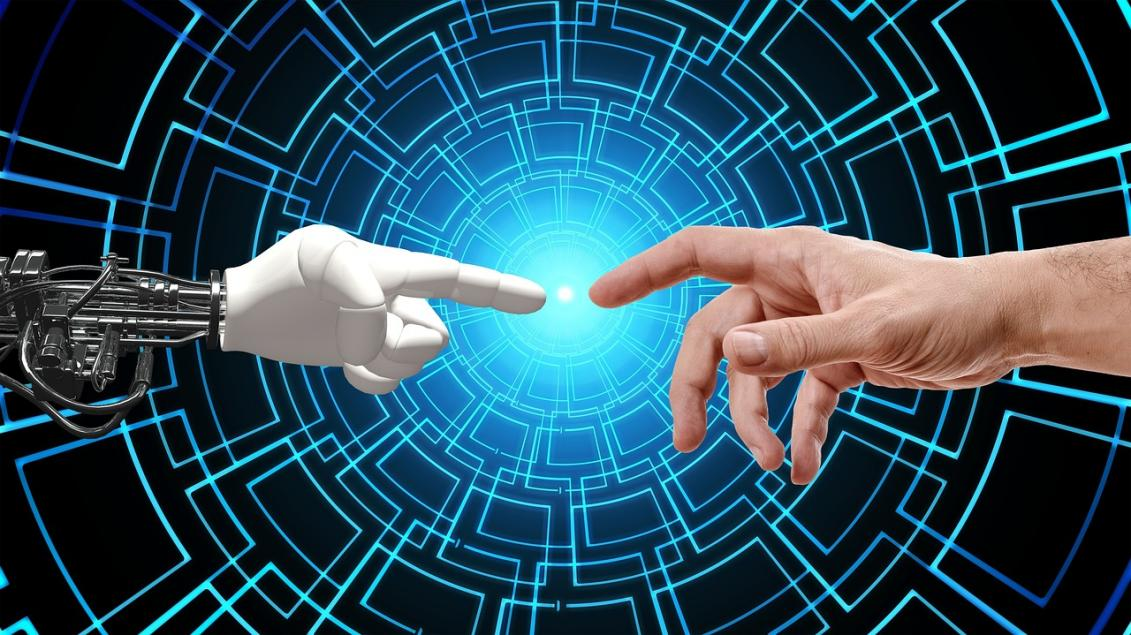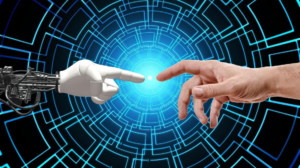The technological and industrial revolution is advancing by the widespread deployment of next generation information and communication technologies, such as AI, IOT (the Internet of Things), etc. As the twenty-first century progresses, artificial intelligence (AI) is poised to lead technological innovation, transforming entire industries, improving our everyday lives, and providing solutions for some of the most important problems facing humanity. AI is an emerging field and it has got its pros and cons along with it. Artificial intelligence has a bright future ahead of it, but it also presents a number of difficult and intriguing difficulties. The main purpose is to review artificial intelligence from the perspective of industry information integration. It uses background information, technological advancements, applications, and logical viewpoints about the field’s growth to give a broad overview of artificial intelligence. This work may contribute to the field of AI research and offer valuable insights for real-world practitioners. This blog explores three main points, considering transformative impacts across industries, ethical implications, and the future ahead.

Transformative Impacts Across Industries
Revolution in Healthcare
AI has the potential to completely transform healthcare, from tailored medication to diagnostics. With amazing precision, machine learning algorithms can spot abnormalities in medical photos that would not be visible to human sight. AI has made it very easy to diagnose and treat different diseases. By analyzing patient data, predictive analytic can anticipate health problems before they happen, resulting in proactive treatment and better results.
AI in Computer Science
Another area of growth is the meeting point of quantum computing and artificial intelligence. Quantum computers have the capacity to process enormous volumes of data much quicker than regular computers. Combining AI with quantum technologies may be able to resolve challenging issues in drug development, optimization, and cryptography. This will lead to an opening of new possibilities and uses for AI.

Self-governing Systems
One of the most obvious applications of artificial intelligence (AI) is the creation of drones and autonomous vehicles. Businesses like Waymo and Tesla are expanding the capabilities of autonomous systems. These systems will run on their own and do not require people to run it. As technology advances, we should anticipate safer roads and more effective delivery systems, but ethical and legal issues will always come first.
Intelligent Systems in Cities
Introducing smart city projects can improve the quality of urban life. AI can help construct more sustainable and livable urban environments, from resource-efficient structures to traffic control systems that minimize congestion and over crowd. These developments will solve urgent environmental issues and enhance the standard of living for local people.
Customization of Education
AI has the ability to customize educational experiences to meet the needs of specific pupils. Real-time adaptation allows intelligent tutoring systems to adjust, offering students individualized support and feedback so they can learn subjects at their own pace. This might democratize education by giving students worldwide access to high-quality resources.
Ethical Implications
1. Fairness and Bias:
The danger of prejudice is one of the most important issues facing AI development. Since AI systems are taught on current data, they may be biased by society. It is imperative to ensure justice and equity in AI applications, which calls for strong frameworks to detect and reduce bias in algorithms.
2. Loss of Employment:
Concerns about job displacement increase when ordinary jobs are automated by AI systems. Even though AI will provide new opportunities, retraining workers who have been replaced by automation will be difficult. A focus on adaptation and lifelong learning will be crucial in preparing for a future in which artificial intelligence (AI) plays a major role. There might be a less chance for people to get a job if they are not well aware of the use of AI.
3. Security and Privacy:
The use of AI in data collecting and analysis is growing, and this has led to an unprecedented rise in privacy issues. Strict legal frameworks and open procedures are necessary to look into the advantages of data-driven insights and the requirement for individual privacy in order to foster public trust.
4.Independent Decision-Making:
There are ethical concerns when it comes to machines being able to make important decisions. The ramifications of AI making decisions on its own are significant and should be carefully considered, ranging from healthcare options to military uses. It can be both beneficial and harmful for the world. As AI systems grow increasingly independent, it will be essential to establish explicit norms and accountability mechanisms.
5.Confidentiality and Monitoring:
The privacy of individuals is being threatened by the proliferation of AI-powered surveillance technology. While data analytics, monitoring algorithms, and facial recognition might improve security, they can also violate civil liberties. When it comes to implementing AI technologies responsibly, governments and organizations will need to discuss how to strike a balance between privacy and safety. Protecting individual rights will require ethical standards and transparent regulations.
The Ftuture Ahead
1. Multidisciplinary Cooperation
Collaboration between technologists, ethicists, policymakers, and the general public is crucial to navigating the intricacies of artificial intelligence. Incorporating different viewpoints will result in more comprehensive answers and guarantee that AI serves society as a whole.
2. Law and Administration
The legal structures that oversee AI technologies must change along with the technology itself. It will be crucial to have thoughtful policies that promote innovation while defending the interests of the general public. A balance between surety of responsibility and promoting growth must be struck by policymakers.
3. Public Awareness and Education
In order to shape a future where AI helps humanity, it will be essential to increase public knowledge of AI and its ramifications. AI can make educational programs enable for people to interact with and have an impact on the technologies that put a great affect on their daily lives.
Conclusion, a future of collaboration
Artificial intelligence has a bright future, but there are obstacles to overcome. Through the prioritization of ethical issues and openness, we can effectively leverage the potential of artificial intelligence to shape a future that works for everyone. The decisions we make now, as we approach the dawn of this new era, will determine the course of artificial intelligence for future generations. We can ensure that we navigate the future responsibly and support innovation that is in line with our values and improves the human experience by embracing AI’s potential while being aware of its implications. The secret to an AI future that is successful is







